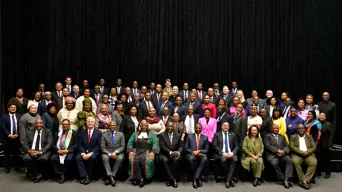YONELA DIKO: Lessons from ’94 | Helen Zille must not inflate the DA’s role in the GNU
The Government of National Unity under President Nelson Mandela in 1994 offers great lessons through similarities for the Government of National Unity under President Cyril Ramaphosa in 2024.

FILE: Newly sworn-in Cabinet ministers pose for a photo with Chief Justice Raymond Zondo and President Cyril Ramaphosa on 3 July 2024. Picture: GCIS
In his book, Dare Not Linger: The Presidential Years, Madiba reflected on the moment he decided on the campaign trail in a Pretoria township ahead of 1995 local government elections to address the National Party on its negative behavioural tendencies as a member of the Government of National Unity (GNU).
Madiba said: “Mr De Klerk has been trying to create an impression that the National Party was playing a leading role in the Government of National Unity, and that business confidence and foreign investments were dependent on his participation in the government. It is wrong to try and inflate the National Party's role out of proportion.”
Today, the Federal Chairperson of the Democratic Alliance (DA), Helen Zille, is behaving like the new National Party, inflating at every opportunity the role of the DA in this GNU of 2024.
Zille must be aware that this is as good as it’s going to get for the stagnant DA and the closest they will ever get to power.
In trying to ensure her party does not get swallowed by the African National Congress (ANC) inside government, she has decided to open another front of trying to amplify her party through charged rhetoric, a clear sign that she has her concerns about DA representatives’ abilities in Cabinet to help the DA.
But it is time to govern. GNU was an agreement. Now we have one government that must work in unison. There are challenges within government that still lay ahead. Our energies must be focused on anticipating those challenges and making this new government work.
Zille's recalcitrant behaviour, which is a mirror image of the behaviour of the then-National Party, inevitably means the GNU is going to struggle in many areas, especially with regard to collective responsibility for all activities of the executive, including those that will not be popular with the public, in the way that the National Party struggled.
Madiba was incensed then by a tendency of the National Party as a member of the then-GNU to publicly criticise Cabinet decisions they had opposed inside Cabinet meetings. According to Madiba, they wanted to claim achievements, but not responsibility for problems.
There’s always a tendency for ministers of smaller political parties to try and outshine the majority party and present themselves as the real leaders of the GNU; a tail wagging the dog. Madiba confronted this tendency head-on.
While Mandela’s GNU was smaller, like Ramaphosa, both presidents have tried to pair ministers and deputy ministers from different political parties to foster cooperation. This also served to reflect the genuineness of the majority party to make all parties feel part of the national government.
After the first Cabinet meeting, Ramaphosa assured the meeting was fruitful and cordial, with different members of political parties now working under his executive conducting themselves well in their first meeting together.
Again, these sentiments echo similar sentiments expressed all those years back by then-Secretary of Cabinet, the great Jakes Gerwel when he reflected in an interview with Peg O'Malley that “One would not be aware that it is a multiparty government if you were sitting in on the debates, on the meetings of the Cabinet. You would not realise that people come from different parties'”.
These were, however, the early days of the GNU, and the clash of purpose and personalities was yet to come. It is not unthinkable that even today, there may well be challenges to the GNU that lie on the road ahead.
The first challenge with the GNU of 1994 as observed by then-Minister of Water Affairs Kader Asmal in his memoirs (Politics in my Blood), was the culture clash between ANC ministers and National Party ministers in how their parties operated.
According to Asmal, ANC ministers had no problem having robust debates against Madiba and Deputy President Thabo Mbeki inside Cabinet, while National Party Ministers never challenged De Klerk on policy debates.
It remains to be seen whether members of the DA or Inkatha Freedom Party (IFP) will be able to challenge their party during Cabinet debates, in the event they hold an opposing view. If the GNU is to succeed, other Cabinet members who are not party leaders must be free to challenge any idea in Cabinet, irrespective of who it comes from.
It’s also going to be a test of resolve on Ramaphosa’s side on whether the step-aside rule will be applicable to errant ministers of the other parties. This was also tough for Madiba, particularly dealing with ministers such as Prince Mangosuthu Buthelezi in moments where Buthelezi had erred enough to warrant dismissal.
After the widely publicised notorious event where Buthelezi threatened an interviewee inside the SABC studios, Madiba was under enormous pressure to fire him. Madiba of course had to consider Buthelezi's constituency, the fragile situation in KZN at the time, and the fact that Buthelezi had been a relatively satisfactory Minister of Home Affairs.
Madiba decided to settle for demanding a public apology from Buthelezi, no doubt a difficult ask for the Prince, which was duly given.
Ultimately, while the president seems to dread any confrontation, the GNU is going to test his patience and his resolve, and may well force him at some point to show just who is in charge of the unity government.
Yonela Diko is the former spokesperson for the Minister of Human Settlements, Water and Sanitation.